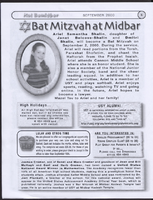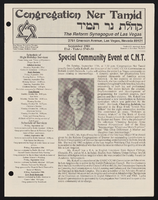Search the Special Collections and Archives Portal
Search Results
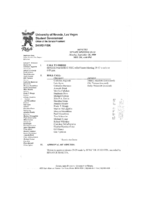
Meeting minutes for Consolidated Student Senate University of Nevada, Las Vegas, September 20, 1999
Date
Archival Collection
Description
Text
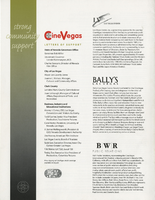
Prospectus for the premier of CineVegas, December 1998
Date
Archival Collection
Description
A prospectus for the premier of CineVegas, an international film festival held in Las Vegas, Nevada.
Text
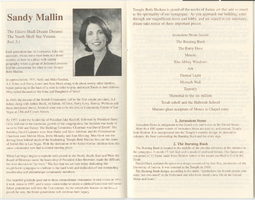
Invitation and program for Temple Beth Sholom building dedication, September 2000
Date
Archival Collection
Description
Temple Beth Sholom invitation and program for the building dedication includes a guide to the Judaic art in the synagogue and a list of past presidents.
Text
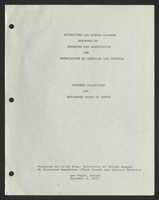
Accredited Law School Library Minimum Collection and Estimated Start Up Costs report
Date
Archival Collection
Description
Folder contains a report titled "Accredited Law School Library Approved by American Bar Association and Association of American Law Schools: Minimum Collection and Estimated Start Up Costs" prepared for Lilly Fong, University of Nevada Regent, By Katherine Henderson, Clark County Law Library Director. From the University of Nevada, Las Vegas William S. Boyd School of Law Records (UA-00048).
Text
Michael Brown (Governor's Office of Economic Development) conducted by Kelliann Beavers: transcript
Date
Archival Collection
Description
From the Lincy Institute "Perspectives from the COVID-19 Pandemic" Oral History Project (MS-01178) -- Government agency interviews file.
Text

Lynnette Sawyer oral history interview: transcript
Date
Archival Collection
Description
Oral history interview with Lynnette Sawyer conducted by Nathalie Martinez on January 03, 2019 for the Latinx Voices of Southern Nevada Oral History Project. Barbara Tabach and Laurents Bañuelos-Benitez also participate in the questioning. Lynnette Sawyer identifies as a Puerto Rican woman born and raised in Spanish Harlem in New York. Her ancestry extends from Spain to Africa and has helped her identity, as she became an educator and museum curator. She describes her life in New York and her journey to Las Vegas. As the founder of the Hispanic Museum of Nevada, she wanted to create a space that would teach young Latinos about their history and heritage.
Text

Kimberly and William King oral history interview: transcript
Date
Archival Collection
Description
Oral history interview with Kimberly and William King conducted by Claytee D. White on November 27, 2017 for the Remembering 1 October Oral History Project. In this interview, Kimberly and William King discuss the October 2017 mass shooting in Las Vegas, Nevada and their experiences from that day. They talk about attending the Route 91 Harvest festival and their struggle to find safety and obtain medical medical attention for William after he was shot. Kimberly describes her feelings regarding the city prior to the shooting and how her perspective on Las Vegas has changed. The couple finish the interview with a discussion of life after the shooting, especially in regards to love and community.
Text

Meeting minutes for Consolidated Student Senate University of Nevada, Las Vegas, October 11, 1990
Date
Archival Collection
Description
Text

